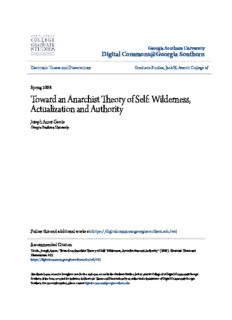Table Of ContentGeorgia Southern University
Digital Commons@Georgia Southern
Electronic Theses and Dissertations Graduate Studies, Jack N. Averitt College of
Spring 2008
Toward an Anarchist Theory of Self: Wilderness,
Actualization and Authority
Joseph Amos Garcia
Follow this and additional works at: https://digitalcommons.georgiasouthern.edu/etd
Recommended Citation
Garcia, Joseph Amos, "Toward an Anarchist Theory of Self: Wilderness, Actualization and
Authority" (2008). Electronic Theses and Dissertations. 425.
https://digitalcommons.georgiasouthern.edu/etd/425
This thesis (open access) is brought to you for free and open access by the Graduate Studies, Jack
N. Averitt College of at Digital Commons@Georgia Southern. It has been accepted for inclusion in
Electronic Theses and Dissertations by an authorized administrator of Digital Commons@Georgia
Southern. For more information, please contact [email protected].
1
TOWARD AN ANARCHIST THEORY OF SELF: WILDERNESS, ACTUALIZATION
AND AUTHORITY
by
JOSEPH AMOS GARCIA
(Under the Direction of William D. McIntosh)
ABSTRACT
This research investigated essential components of optimal human functioning. An
anarchist model was used to emphasize the autonomous nature of an optimally
functioning self. Utilizing Abraham Maslow’s hierarchy of needs model, Leonard
Martin’s I-D compensation theory, fundamental principles of anarchist theory and
environmental feedback paradigms it has been shown that time spent during backpacking
experiences in the wilderness may simulate immediate return social systems, allow for
recognition of need fulfillment and ultimately increase self-actualization. In addition it
was shown that materialism, via an ownership index, is negatively correlated with
actualization. Utilizing a backward regression analysis the resulting model supports the
hypothesis that immediate return social systems as well as anti-materialist sentiments
contribute to optimal function as indicated by the Short Index of Self Actualization. The
results lend support to the anarchist theory of self as a meta model of optimal human
function, socially as well as individually.
INDEX WORDS: Anarchism, Anarchy, Actualization, Authority, Self, I-D
compensation, Terror management, Optimal functioning, Wilderness
2
TOWARD AN ANARCHIST THEORY OF SELF: WILDERNESS, ACTUALIZATION
AND AUTHORITY
by
JOSEPH AMOS GARCIA
A Thesis Submitted to the Graduate Faculty of Georgia Southern University in Partial
Fulfillment of the Requirements for the Degree
MASTER OF SCIENCE
STATESBORO, GEORGIA
2008
3
© 2008
Joseph A. Garcia
All Rights Reserved
4
TOWARD AN ANARCHIST THEORY OF SELF: WILDERNESS, ACTUALIZATION
AND AUTHORITY
by
JOSEPH AMOS GARCIA
Major Professor: William D. McIntosh
Committee: Lawrence Locker
Edward W. Smith
Electronic Version Approved:
May 2008
5
DEDICATION
This work is dedicated to my son, Sammael Leanza Garcia, born on December,
19th 2007.
Tao Te Ching 44
Fame or self: Which matters more?
Self or wealth: Which is more precious?
Gain or loss: Which is more painful?
He who is attached to things will suffer much.
He who saves will suffer heavy loss.
A contented man is never disappointed.
He who knows when to stop does not find himself in trouble.
He will stay forever safe.
6
ACKNOWLEDGMENTS
Thank you to my committee and the Department of Psychology at Georgia
Southern University for fostering an environment in which an individual may freely and
safely explore the fringes of their field.
7
TABLE OF CONTENTS
Page
ACKNOWLEDGMENTS...................................................................................................6
LIST OF TABLES..............................................................................................................8
CHAPTERS
1 INTRODUCTION.............................................................................................9
2 EXPERIMENT................................................................................................32
3 M ETHOD.......................................................................................................36
4 RESULTS........................................................................................................39
5 DISCUSSION.................................................................................................41
REFERENCES..................................................................................................................48
APPENDICES
A SCALES..........................................................................................................52
B SURVEY.........................................................................................................55
8
LIST OF TABLES
Page
Table 1: Coefficients for Model Variables in Wilderness Data........................................39
Table 2: Coefficients for Model Variables in Non-wilderness Data.................................40
9
CHAPTER 1
INTRODUCTION
One of the overarching themes binding the theories of self has been that the self,
or the true self, is the source of psychological balance and health. Freud advocated a deep
analysis of self in order to become free of hysteria. Psychoanalysis, developed by Joseph
Breuer, was taken up and further developed by Freud. In this process the suppressed
source of the symptoms of hysteria are excavated from the unconscious and confronted
consciously. The ultimate function of this process is to consciously confront and integrate
previously unconscious memories in order that the self might become less fractured and
consequently emotionally unified. Through this integration, the power of an individual’s
unconscious memory to manifest in physical symptoms such as hysteria is alleviated
(Freud, 1955).
Carl Jung postulated that the true Self is attained by individuation from social
archetypes. Integration of these, as well as the conscious and unconscious aspects of Self,
lead not only to a holistic view of Self but a healthy independence. Jung explains that the
unconscious aspects of Self, if repressed, can result in psychosis. In the case of ignoring
this aspect of Self torment by the very forces one is trying to ignore would ensue. This
torment can take the form of dreams and sometimes possession in which the unconscious
seems to be “acting out” in an attempt to restore natural balance. Jung called this union of
the conscious and unconscious the “transcendent function” (Jung, 1959a, 1959c). Alfred
Adler referred to a similar function as the “striving for perfection”. He explained that
man struggles against his own feelings of inferiority and that overcoming this is followed
Description:INDEX WORDS: Anarchism, Anarchy, Actualization, Authority, Self, I-D .. the idea of human needs from their most basic forms (e.g. physiological

